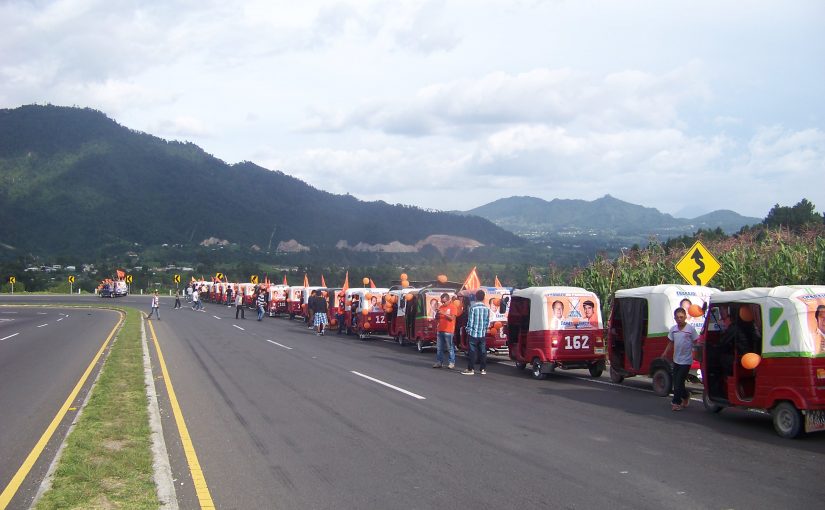The following words act as spatial markers. They place objects and people in relation to a set of spatial coordinates having the speaker at the origin. The first two (naqaj, naj) place distance from the speaker on a relative scale: near, far away; the third, fourth and fifth (waral, chi’, chi’ la’) are deictic forms, that is, words that require ostensive gestures to reference their objects.
Listen to the following conversation. Can you guess which words refer to spatial distance?
Xtu’p: Xb’e q’ij a Xwan.
Xwan: Xb’e q’ij.
Xtu’p: La utz awach?
Xwan: Utz, maltyox. E k’u ri at? La utz awach?
Xtu’p: Je’, utz, maltyox. Jawi katb’e wi?
Xwan: Pa Tzoloj Ya’ kimb’e wi.
Xtu’p: La naj le tinamit?
Xwan: Na si ta naj.
Xtu’p: Ah, utz. Jachike ramaj katzalij loq?
Xwan: We ne pa 8 o 9 kintzalij loq.
Xtu’p: La kulatija le awa chi’?
Xwan: Na kulnutija taj, par waral kinulwara wi.*
Xtu’p: Ah utz. Nojim katb’ek.
Xwan: Maltyox!
Xtu’p: Jeb’a!
Xwan: Jeb’a!
*These are forms of the verbs tij(o) to eat and war(ik) to sleep. They include “incorporated movement,” about which we will have a lesson later on.
Xtu’p: Good afternoon, Xwan.
Xwan: Good afternoon.
Xtu’p: How are you?
Xwan: Good, thanks. And you? How are you?
Xtu’p: Good, thanks. Where are you going?
Xwan: I am going to Sololá (Tzoloj Ya’)
Xtu’p: Is that town far away?
Xwan: Not very far.
Xtu’p: Ah, ok. What time will you return?
Xwan: I will return maybe at 8 or 9.
Xtu’p: Will you come here to eat?
Xwan: I won’t come here to eat, but I will come to sleep.
Xtu’p: Ah, ok. Be safe (lit: go slowly).
Xwan: Thanks!
Xtu’p: Bye!
Xwan: Bye!
A) NAQAJ
A relational noun, it quantifies the distance between two people/objects as relatively small. It is complemented by a prepositional phrase with -E (chi+ -E + naqaj)
- Le wo’ch k’o chunaqaj le nimatijob’al.
My house is near the university. - Chinunaqaj xk’oji’ wi.
She was/stayed near me. - Naqaj kint’uyi’ wi chawe.
I am sitting close to you. - Naqaj k’o wi le nutinamit.
My town is near.B) NAJ
An adverb, it quantifies the distance between two people/objects as relatively large. It is never possesed unlike naqaj. - Naj k’o wi le wo’ch.
My house is far away. - Naj kint’uyi’ wi chawe.
I am sitting far from you. - Naj k’o wi le wo’ch chuwach le tijob’al.
My house is farther away than the church (as seen from a third location). - Naj k’o wi le wo’ch che le tijob’al.
My house is far from the school.Naj is also used to quantify duration (a long time): - Naj xtz’e’n le ne’.
The baby cried for a long time - Naj xub’an le chomal.
The meeting took a long time. - Naj xub’an le b’inem.
The walk took a long time.
C) WARAL
A deictic form, it can be translated as “here.” It references the speaker’s proximal space, which depending on the context may be the precise point where he/she is located, his/her abode, village, city etc. - Waral kint’uyi’ wi.
I am sitting here.D) CHI’
A deictic form, it can be translated as “right here.” It references the speaker’s precise location. - Chi’ kewar wi le ak’alab’.
Here are the kids sleeping.E) CHILA’
A deictic from, it can be translated as “there.” It references a more or less precise space located distally both from speaker and addressee. - Chila’ kewar wi le ak’alab’.
The kids are sleeping over there.
| nojim katb’ek | (lit: go slowly) an idiomatic expression that is used to tell someone to be careful/be safe/ take care when going somewhere |
| chomal | meeting |
| b’inem | (noun) walk; stroll |
| k’achelaj | forest |
| b’inel ja’ | river |
| tzalij(ik) | to return |
| tz’e’n(ik) | to cry (also refers to certain animal cries) |
| t’uyi’ (vit) | to sit (positional) |
| tij(o) anim | to run |
Translate the following sentences to K’iche’:
- Where are we going?
- The university is very far from my house.
- My classmate lives near the river.
- The forest is over there.
- My town is far from your town.
- I am from _______________.
- Is there food here, at the meeting?
- I run over there, on the road.

